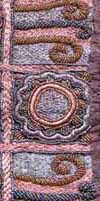46. CLIENTS TURNED CO-WORKERS
The distinction between
the legal practice in Natal and that in the Transvaal was that in Natal
there was a joint bar; a barrister, whilst he was admitted to the rank
of advocate, could also practise as an attorney; whereas in the Transvaal,
as in Bombay, the spheres of attorneys and advocates were distinct. A barrister
had the right of election whether he would practise as an advocate or as
an attorney. So, whilst in Natal I was admitted as an advocate, in the
Transvaal I sought admission as an attorney. For as an advocate I could
not come in direct contact with the Indians, and the white attorneys in
South Africa would not have briefed me.
But even in the Transvaal it
was open to attorneys to appear before magistrates. On one occasion, whilst
I was conducting a case before a magistrate in Johannesburg, I discovered
that my client had deceived me. I saw him completely break down in the
witness box. So without any argument I asked the magistrate to dismiss
the case. The opposing counsel was astonished, and the magistrate was pleased.
I rebuked my client for bringing a false case to me. He knew that I never
accepted false cases, and when I brought the thing home to him, he admitted
his mistake, and I have an impression that he was not angry with me for
having asked the magistrate to decide against him. At any rate my conduct
in this case did not affect my practice for the worse, indeed it made my
work easier. I also saw that my devotion to truth enhanced my reputation
amongst the members of the profession, and in spite of the handicap of
colour I was able in some cases to win even their affection.
During my professional work
it was also my habit never to conceal my ignorance from my clients or my
colleagues. Wherever I felt myself at sea, I would advise my client to
consult some other counsel, or if he preferred to stick to me, I would
ask him to let me seek the assistance of senior counsel. This frankness
earned me the unbounded affection and trust of my clients. They were always
willing to pay the fee whenever consultation with senior counsel was necessary.
This affection and trust served me in good stead in my public work.
I have indicated in the foregoing
chapters that my object in practising in South Africa was service of the
community. Even for this purpose, winning the confidence of the people
was an indispensable condition. The large-hearted Indians magnified into
service professional work done for money, and when I advised them to suffer
the hardships of imprisonment for the sake of their rights, many of them
cheerfully accepted the advice, not so much because they had reasoned out
the correctness of the course, as because of their confidence in, and affection
for, me.
As I write this, many a sweet
reminiscence comes to my mind. Hundreds of clients became friends and real
co-workers in public service, and their association sweetened a life that
was otherwise full of difficulties and dangers.

